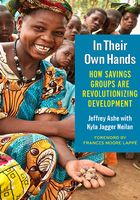
Preface: Ray Offenheiser
Ray Offenheiser is the president of Oxfam America.
When Jeffrey Ashe joined Oxfam America ten years ago, I admit that I had reservations about how his savings group model would sit with Oxfam’s rights-based approach to development and our strategic goals. But I recognized the approach as an innovative one, and it was an idea with strong potential to be scaled up. And anything that builds the resilience of women and men living in poverty aligns with Oxfam’s mission. So Jeff joined us.
Sometimes it pays to take a chance. I am proud that we at Oxfam took that risk with Jeff.
Saving for Change is one of the most successful development innovations I have witnessed in my career. It turns the traditional notion of microcredit on its head by allowing group members to save before they borrow. The premise of Saving for Change is that the poor are not too poor to save but are instead too poor not to save. When neighbors save a few cents together each week, not only do they gain access to basic financial services, but they also build social capital on a foundation of trust and solidarity.
Today, savings groups are reinventing themselves. The byproducts of savings have proven to be every bit as valuable as the savings themselves. Gains in social capital, self-confidence, and women’s empowerment translate into health and maternity clinics, grain banks, markets, and thousands of thriving small businesses.
Savings groups have unexpectedly created a channel for delivering other benefits to members. Participants drive this process. At their request, Oxfam has used groups as an educational forum, offering training on topics such as business, citizenship, and agriculture in addition to our basic training module. Saving for Change has also become part of a larger effort at Oxfam: our Rural Resilience Initiative—a partnership to innovate and develop better tools to help vulnerable farmers mitigate the risks and consequences of climate change so that they can earn a living and support their families.
What is perhaps most striking about Saving for Change is how it seems to strengthen the capacity of individual village-level savings groups to solve problems: to identify what their communities need, to organize themselves, and to seek solutions independent of aid organizations such as Oxfam. People are learning more about their ability to help themselves. In Mali, women concerned that the nearest health clinic was too far away used their group funds to build a clinic—right there in the village. They convinced each family to contribute one hundred bricks for building and used their newly acquired influence to gain the mayor’s support. In Africa and Central America, savings groups are coming together in local associations to hold authorities accountable, ensuring that local government officials honor their development promises. In Senegal, eight women decided to represent their communities by seeking seats on local mining councils. They report that they would never have considered such a role had they not become participants in Saving for Change.
There are countless similar stories. Even the simplest is remarkable, because each traces how the seemingly mundane creation of a savings group can change the lives of dozens—sometimes hundreds, even thousands—of women, children, and men. The task of choosing whose stories to tell must not have been an easy one. But Jeff did just that. Sifting through years of research, rich experiences, and his notebooks, he carefully selected stories that allow the reader to meet the women and men who accompanied him on his journey and are changing the world every day.
When I consider the benefits of Saving for Change—the money saved and loaned, the financial gains, the increase in social capital—I think often of a woman I met in Mali. She was walking to her savings group meeting, a small hand-carved foot stool balanced on her head scarf. The change these women are creating in their lives is impressive, and their business meetings are often infused with an unmistakable air of celebration. What she told me gave me a glimpse of the incalculable benefits that members accrue: “When you miss a meeting,” she explained, “you miss the best party of your life.”
They certainly have reason to celebrate.